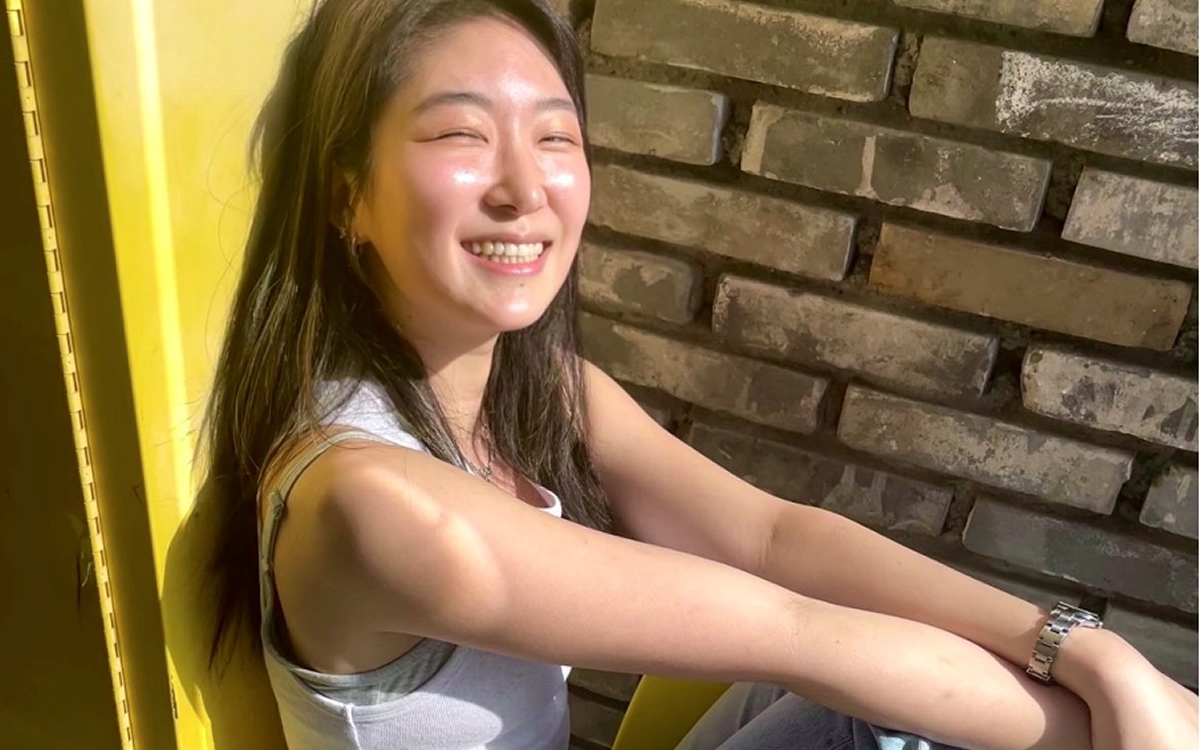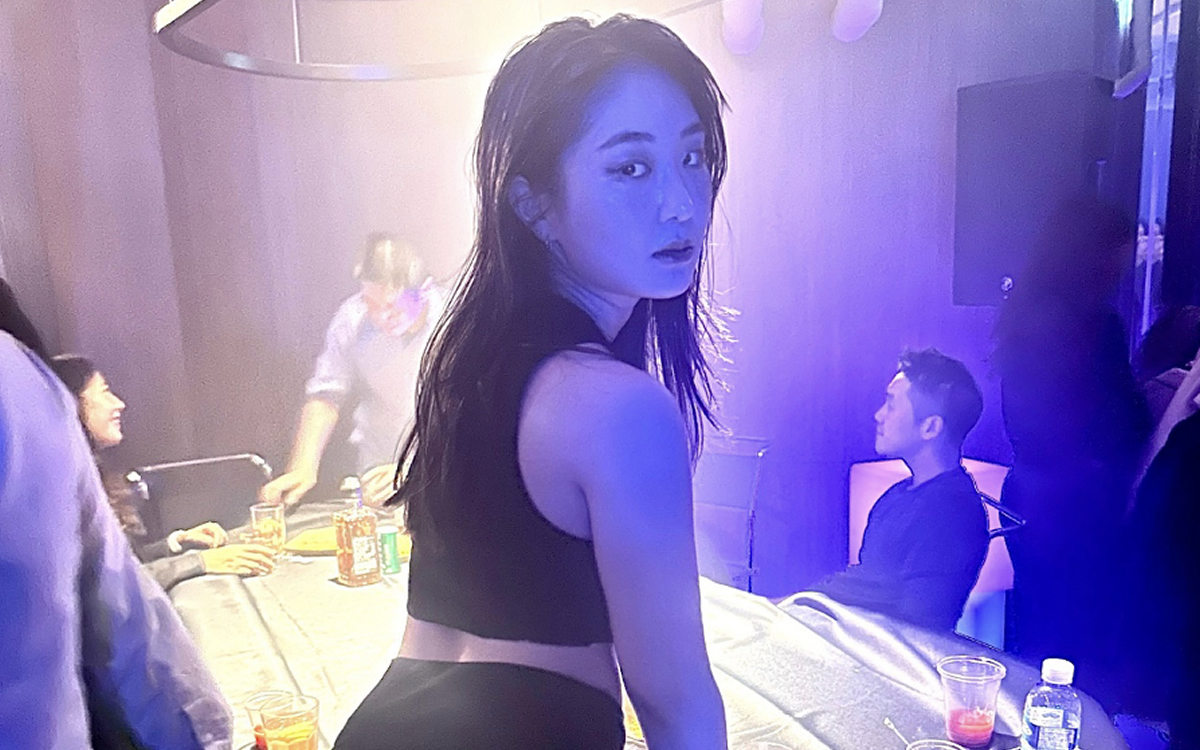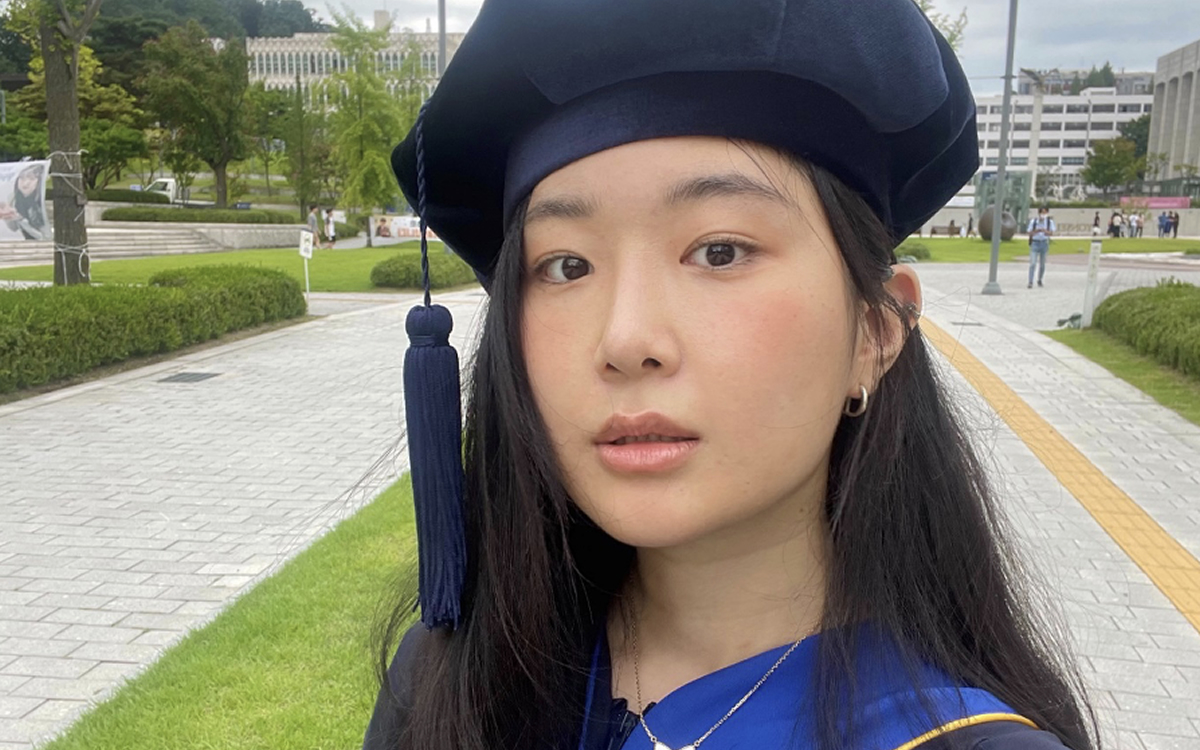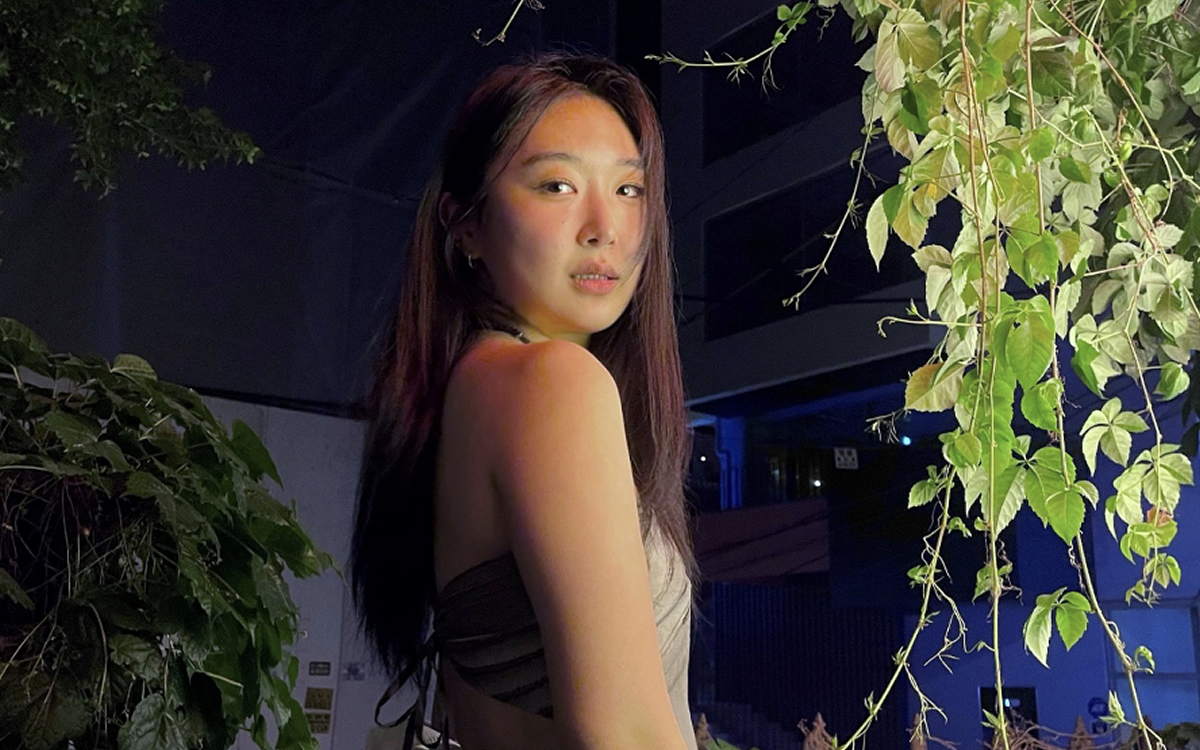Asia
Bisexual YouTuber challenges fellow South Koreans
Anti-gay protesters confronted Kelsey the Korean at Seoul Pride festival

Kelsey the Korean is a bisexual YouTuber best known for her refreshing directness and crazy life stories. Made obvious by her username, she is a Korean named Kelsey making videos in English about South Korea, LGBTQ issues, sex, mental health, her family feuds and more, with the aim of fostering a no-bullshit insight into South Korean society.
You’d never guess by watching Kelsey’s videos about her colorful sex life or uncensored stories about her over-bearing “tiger mom,” but Kelsey is actually an introvert.
“A lot of people assume that I’m extraverted but it’s like, uhh … I’m not. In reality it’s one of the best jobs [YouTuber] for an introvert ‘cause you don’t have any co-workers basically, and you can just talk to a camera,” she said. “People sort of get scared when they meet me in person — or startled — because they’re like, “You’re so quiet, are you mad?’”
As an open bisexual woman in a conservative country, Kelsey is brave.
“It’s harder than North America in general, it depends on which district obviously [of America] because I’ve heard even in America there are some places where it’s as conservative as Korea, so I don’t want to make it like a dichotomy where the West is so ‘open’ and Korea is ‘not,’” she said. “In Korea it’s definitely harder to find people in my generation [25- to 30-years old] that are open — which is a little bit shocking to me — but it’s easier in other ways because Korean people are not very outspoken.”
A 2021 survey showed that 26.5 percent of South Koreans would accept an LGBTQ neighbor, 13.8 percent would accept an LGBTQ co-worker and 5.3 percent would accept an LGBTQ best friend.

Kelsey is not a complete stranger to anti-LGBTQ hate.
In one of her YouTube videos she visited gay Pride in Seoul which was met with homophobic protestors.
“Last year was really shocking because there were so many Christian protestors who were really mad, and the shocking thing was they even brought their children, who were like 5 or 7 and made them hold ‘gay people have AIDS’ [signs],” she said.
Seoul’s Queer Culture Festival (gay Pride) hit a wall this year when it was denied a permit by the Seoul Metropolitan Government, despite holding the festival in Seoul Plaza for many years. The Seoul Metropolitan Government’s reasoning was that another group had requested access to Seoul Plaza on July 1 so the government gave the other — a Christian youth concert — priority. Despite this setback, Seoul’s Queer Culture Festival organizers didn’t let this stop them celebrating pride at an alternative space.

South Korea has rapidly progressed since the Korean War and society is more open-minded and accepting but society is still not open enough to accept openly LGBTQ people. How does Kelsey feel about the future of LGBTQ rights in Korea?
“Oh God, I’ve only been following gay rights in Korea for five years,” she said. “It’s not good because since the Yoon administration, they’re making it harder definitely.”
Yoon Suk-Yeol is the current politically conservative president of South Korea.

“As for the future of LGBTQ rights in Korea, I don’t know. It could go either way in my opinion. Even in the youth I don’t see that much change, but our youth percentage is declining, so there’s gonna be more boomers as time goes on and they’re not gonna be open. They’re gonna be really boomer,” she said.
Although Kelsey wants more LGBTQ acceptance in Korea, education on transgender identity in a Vancouver school was a step too far for her.
“With LGBTQ rights, Korea is very conservative but I was really taken aback by how far the west seems to have taken it because when I was in Vancouver six months ago I became friends with this 8-year-old boy and he was in elementary school. He said that in Vancouver it was very left politically and in his public elementary school during sex-ed they taught his class that there [are] infinite genders. Then a trans person came in and just talked about his life trauma — I guess — and how they wanted to be called ‘they.’” she said. “I [was] so shocked to hear that because, personally — maybe I’ll change my mind and be so shocked at how conservative I am reading back to this article in 10 years — but right now that is too far for me. I don’t want it to be in public education [that] you can be trans or you can be gay when you’re 8- [years old].”
Kelsey wants to uplift other LGBTQ viewers who watch her YouTube channel. Her words of advice?
“First of all be patient because people like me who are Gen-Z and multicultural pick the best country they’ve been in — in regards to how it benefits them — and they’re like ‘Why isn’t my country, right now, not fitting that standard?’” she said.
Kelsey calls herself a multicultural Korean because she lived in Australia and Canada.
“It’s gonna take a long time for Korea to change,” she said. “The conclusion I came to is that I’ll just do whatever I can, but I can’t be overwhelmed or too stressed.”
India
Opposition from religious groups prompts Indian Pride group to cancel annual parade
Event was to have taken place in Amritsar on April 27

Pride Amritsar, a student-led organization in the Indian state of Punjab, earlier this month announced the cancellation of its Pride parade that was scheduled to take place on April 27, citing opposition from certain religious groups.
The event, planned for the Rose Garden in Amritsar, a city revered as a spiritual center of Sikhism, had faced mounting resistance from Sikh religious organizations, including the Nihang Singh faction and the Akal Takht, the faith’s highest temporal authority. These groups labeled the parade as “unnatural” and urged local authorities to deny permission, citing its potential to disrupt the city’s religious sanctity.
In an Instagram post on April 6, Pride Amritsar organizers Ridham Chadha and Ramit Seth elaborated on its mission and the reasons for the cancellation.
“Since 2019, we have organized peaceful parades and celebrations in Amritsar to connect and uplift the LGBTQIA+ community, with a particular focus on transgender individuals and their rights,” their statement read.
Chadha and Seth highlighted Pride Amritsar efforts in providing guidance, counseling, and job opportunities, which have been met with positive responses. However, due to opposition this year, Pride Amritsar announced the cancellation of the 2025 parade.
“We have no intention of harming the sentiments of any religious or political groups,” the statement read. “The safety of our members is our top priority, and we will take all necessary measures to ensure their protection.”
Chadha and Seth spoke with the Washington Blade about their decision to cancel the parade.
They explained that resistance came from both religious and political groups who labeled the parade and its values as anti-Sikh and contrary to Punjabi and Indian cultural norms. Critics specifically objected to the event’s location in Amritsar, a city regarded as a sacred center of Sikhism, arguing that the parade would disrupt its spiritual purity.
Chadha and Seth stressed Pride Amritsar lacks political, financial, or legal support. Composed of students and young professionals, the group organizes the parade biennially, dedicating personal time to advocate for the LGBTQ community.
“We do it independently, crowdfund the parade and cover the rest with our pockets,” said Seth and Chadha.
When asked by the Blade why Pride Amritsar did not approach the High Court or local authorities to protect the parade, despite the Supreme Court’s 2018 ruling that decriminalized consensual same-sex sexual relations, Chadha and Seth cited significant barriers.
“Pursuing legal action in India requires substantial resources, both financial and temporal,” they explained.
Chadha and Seth also noted that such action could lead to public shaming and unwanted publicity for participants, potentially harming their careers in Amritsar. They therefore chose not to pursue legal recourse.
Chadha and Seth said Pride Amritsar does not have any plans to hold alternative events.
“We are still exploring options, but we are likely not holding any events this year,” they said, citing significant harassment that organizers faced and the need for time to plan how to best serve the local LGBTQ community moving forward.
“Our evaluation of what the biggest challenge is has changed after this year,” said Chadha and Seth to the Washington Blade. “The biggest challenge, by far, seems to be education. We need to educate the community about what the community is, does, and why it exists. Why we do parades. Why we dance. Why calling someone ‘chakka’ is harmful. How we actually fit into religion and fall within the guidelines.”
Chadha and Seth said organizing the parade in Amritsar since 2019 has been an uplifting experience, despite continued opposition.
“The moment you join the parade, chant a slogan, or sing a song, it’s transformative,” they said. “Fear vanishes, and a sense of freedom takes over.”
The cancellation of the 2025 Amritsar Pride Parade has sparked concerns among activists in Punjab, as the Indian Express reported.
The Punjab LGBT Alliance and other groups expressed concern that the decision to cancel the parade may strengthen opposition to future LGBTQ-specific events.
Myanmar
LGBTQ advocacy group joins Myanmar earthquake relief effort
March 28 quake killed thousands, devastated country’s second-largest city

A powerful earthquake that rocked Myanmar on March 28 unleashed devastation across the central part of the country.
The U.S. Geological Survey measured the quake at 7.7, and pinpointing its epicenter roughly 10 miles west of Mandalay, the country’s second-largest city. A 6.4-magnitude aftershock jolted the area 12 minutes later, compounding the destruction and deepening the crisis for a nation already strained by conflict.
The earthquake struck with terrifying intensity near its epicenter, wreaking havoc on Mandalay and the nearby city of Sagaing.
Mandalay, a bustling city of approximately 1.5 million residents, bore the brunt of the destruction. Among the most striking losses was the 12-story Sky Villa Condominium, which collapsed, leaving scores trapped beneath the wreckage. Rescue workers scrambled to pull survivors from the rubble, but the rising death toll underscored the tragedy’s magnitude.
In Sagaing, which is located closer to the epicenter, more than 70 percent of buildings sustained damage. The Ava Bridge, an essential artery spanning the Irrawaddy River, collapsed, cutting off a critical connection to Mandalay. The earthquake’s shallow depth of less than seven miles amplified its power, reducing homes, temples, and schools to rubble.
The earthquake’s death toll continues to climb, with at least 3,649 confirmed dead, more than 5,000 injured, and approximately 145 people missing. Amid the widespread devastation, questions loom about the impact on vulnerable populations. The Washington Blade reached out to Colors Rainbow, an organization advocating for LGBTQ rights in Myanmar, to understand how the crisis has affected one of the nation’s most marginalized communities.
Colors Rainbow Executive Director Hla Myat Tun spoke about how his organization is working to address the crisis faced by Myanmar’s LGBTQ community in the aftermath of the earthquake.
Colors Rainbow has implemented a system of multipurpose cash transfers, directing funds to local LGBTQ partner organizations. These grassroots partners, in turn, provide essential support to affected individuals that includes emergency cash assistance, food, non-food items, clean water, and basic emotional support tailored to the immediate needs of their communities.
“We estimate that around 500–800 LGBTQ individuals have been impacted in the affected areas, particularly in Mandalay Region, Sagaing Region, and southern Shan state,” said Hla Myat Tun. “So far, we have been able to directly assist around 80–100 LGBTQ individuals.”
Hla Myat Tun told the Blade that Colors Rainbow is actively gathering data to assess the specific challenges that LGBTQ people are facing in the aftermath of the earthquake.
Preliminary observations, he noted, point to heightened vulnerability among LGBTQ people, driven by social exclusion and limited access to mainstream humanitarian aid. Hla Myat Tun, however, emphasized more comprehensive information is necessary to fully understand the scope of their needs and vulnerabilities in this crisis.
“We are partnering with international LGBTQ and feminist organizations that focus on displaced communities,” said Hla Myat Tun. “These partners provide emergency funds, and we coordinate with local LGBTQ groups to deliver aid directly to affected individuals on the ground.”
Addressing reports of military restrictions on humanitarian aid, Hla Myat Tun explained how Colors Rainbow is managing to reach LGBTQ people who are in conflict zones and areas the military junta controls. Hla Myat Tun highlighted the importance of the organization’s trusted local LGBTQ partners, who are embedded in these regions. Their presence and established networks, he said, are vital in navigating restricted areas and ensuring that aid reaches the LGBTQ people who are most in need.
Hla Myat Tun also provided insight into how Colors Rainbow is tailoring its relief efforts to meet the LGBTQ community’s specific needs.
He said his organization is gathering information directly from LGBTQ people through close coordination with its local partners, relying on both formal and informal communication channels. Hla Myat Tun told the Blade his team conducts daily check-ins via quick telephone calls, ensuring a continuous flow of information to guide their response efforts despite limited internet access, electricity and other challenges.
“Our approach is collaborative — we set strategies and share responsibilities to respond flexibly and safely, based on the rapidly changing local context,” he said. “Personal stories are being documented, but for security reasons, we are cautious about sharing them publicly.”
When asked whether staff or volunteers had harassment, discrimination, or violence while delivering aid — a concern given the precarious legal and social climate for LGBTQ people in Myanmar — Hla Myat Tun said there have been no reported incidents thus far.
“So far, we haven’t received any reports from our staff or local partners about harassment or violence while delivering aid,” he noted, emphasizing Colors Rainbow remains vigilant and has implemented robust safety protocols to protect all involved.
Colors Rainbow relies primarily on funding from international LGBTQ-focused partners. He noted, however, humanitarian funding specifically dedicated to LGBTQ communities remains vastly under-resourced, relative to the pressing needs on the ground. Hla Myat Tun said this shortfall severely limits the scale and reach of Colors Rainbow’s efforts.
“While Myanmar’s legal framework remains outdated, societal attitudes — especially during the civilian government — have shown signs of progress,” said Hla Myat Tun. “We have seen positive change thanks to the work of local LGBTQ organizations.”
“In the current crisis, many communities are working together despite legal barriers. However, in areas without LGBTQ-led organizations, inclusive humanitarian responses are still lacking,” he added. “There’s an urgent need for international humanitarian actors to understand and implement LGBTQ-inclusive practices in Myanmar.”
When asked about long-term strategies to support the recovery and resilience of LGBTQ communities as Myanmar rebuilds, Hla Myat Tun affirmed Colors Rainbow is deeply committed to fostering resilience. The organization’s initiatives include leadership development, community empowerment through training and workshops, sub-granting programs, and organizational development support. He also highlighted Colors Rainbow’s advocacy for LGBTQ-inclusive policies and collaboration with ethnic groups to promote an inclusive federal democracy, and specifically thanked Outright International, a global LGBTQ and intersex rights group, for “amplifying our work.
“This kind of international attention shines a spotlight on the challenges LGBTQ communities in Myanmar are facing and helps open doors for more support,” Hla Myat Tun told the Blade. “It also boosts visibility and solidarity, both locally and globally, which we deeply appreciate.”
India
LGBTQ poets included in India’s premier literary festival
Sahitya Akademi seen as mirror of government’s cultural agenda

India’s premier literary institution on March 7 announced it would allow LGBTQ poets to participate in its marquee Festival of Letters in New Delhi.
The Sahitya Akademi, often seen as a mirror of the government’s cultural agenda, for the first time allowed these poets into a high-profile poetry reading at the Rabindra Bhavan. They shared the stage with more than 700 writers across 50 languages.
Culture and Tourism Minister Gajendra Singh Shekhawat kicked off the Festival of Letters with Mahesh Dattani, the acclaimed English-language playwright famed for his provocative works, as the main guest. Dubbed Asia’s grandest literary gathering, the Sahitya Akademi took place over six days under the “Indian Literary Traditions” theme.
The 2025 Festival of Letters showcased a sweeping range of voices — young writers, women writers, Dalit authors from marginalized castes, Northeast Indian scribes, tribal poets, and LGBTQ poets — cementing its reputation as a literary kaleidoscope.
Kalki Subramaniam, a leading transgender rights activist and author, on March 9 chaired a literary session titled “Discussion on Literary Works of LGBTQ Writers in the 21st Century,” which spotlighted contemporary queer voices.
“It was enriching to listen to the profound thoughts of LGBT writers from various parts of the country in their speeches,” said Subramaniam. “The session was particularly memorable with the participation of A. Revathi Amma from Tamil Nadu, Reshma Prasad from Bihar, Sanjana Simon from New Delhi, and Devika Devendra Manglamukhi and Shivin from Uttar Pradesh and Aksaya K Rath from Orissa.”
Subramaniam discussed how global politics shape gender rights and the persistent erasure of trans identity, urging a unified push for solidarity within the LGBTQ community. She stressed the vital need to elevate queer works and writers, casting their voices as essential to the literary vanguard.
“It was a pleasure to meet great writers from around the country in the festival as well as meet my writer activist friends Sajana Simon and Revathi Amma after a long time,” said Subramaniam.

The government on March 12, 1954, formally established the Sahitya Akademi. A government resolution outlined its mission as a national entity tasked with advancing Indian literature and upholding rigorous literary standards; a mandate it has pursued for seven decades.
The Sahitya Akademi in 2018 broke ground in Kolkata, hosting the country’s first exclusive gathering of trans writers, a landmark nod to queer voices in Indian literature.
Hoshang Dinshaw Merchant, India’s pioneering openly gay poet and a leading voice in the nation’s gay liberation movement, on March 9 recited a poem at the Festival of Letters, his verses carrying the weight of his decades-long quest for queer recognition. He later thanked the session’s chair for welcoming the community, a gesture that underscored the event’s third day embrace of diverse voices.
The Sahitya Akademi in 2024 honored K. Vaishali with the Yuva Puraskar for her memoir “Homeless: Growing Up Lesbian and Dyslexic in India,” a raw account of navigating queerness and neurodivergence. Vaishali in a post-win interview reflected on India’s deep-seated conservatism around sexuality, noting she wrote from a place of relative safety — an upper-caste privilege that shielded her as she bared her truth. The award, she said, was the Akademi’s indelible seal on her lived experience, a validation no one could challenge.
The Sahitya Akademi’s inclusion of LGBTQ writers in its main program this year jars with the Bharatiya Janata Party-led government’s conservative stance, which, in 2023, opposed same-sex marriage in the Supreme Court, arguing it erodes Indian family values. Yet, under Shekhawat, the Sahitya Akademi’s spotlight on queer voices at the Rabindra Bhavan suggests it could be a tentative crack in a regime typically rooted in tradition.
The Festival of Letters hosted a translators’ meeting on March 10, spotlighting P. Vimala’s 2024 award-winning Tamil translation of Nalini Jameela’s “Autobiography of a Sex Worker,” a work steeped in marginalized voices that include queer perspectives.
This platform gained significant support from the BJP-led government, with Shekhawat securing a 15 percent budget increase to ₹47 crore ($5.63 million) in 2024. In Tamil Nadu state, however, Dravida Munnetra Kazhagam’s Chief Minister Muthuvel Karunanidhi Stalin, has long opposed such cross-linguistic efforts, fearing dilution of Tamil identity amid decades of anti-Hindi sentiment — a tension the Sahitya Akademi’s inclusive showcase sought to bypass.
‘The Akademi is very inclusive and has a friendly festival ambience,” Subramaniam told the Washington Blade.
-

 Federal Government2 days ago
Federal Government2 days agoHHS to retire 988 crisis lifeline for LGBTQ youth
-

 Opinions2 days ago
Opinions2 days agoDavid Hogg’s arrogant, self-indulgent stunt
-

 District of Columbia2 days ago
District of Columbia2 days agoD.C. police seek help in identifying suspect in anti-gay threats case
-

 Opinions2 days ago
Opinions2 days agoOn Pope Francis, Opus Dei and ongoing religious intolerance












